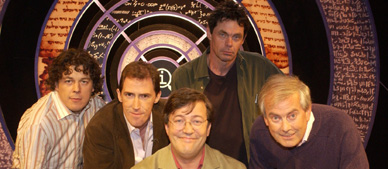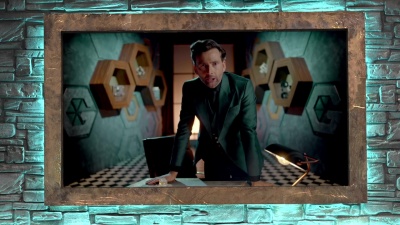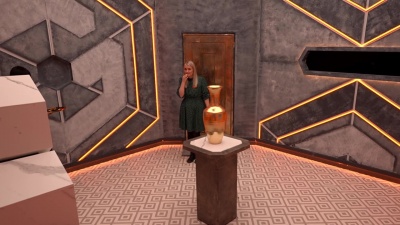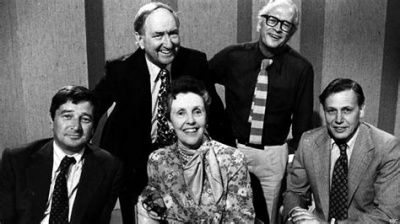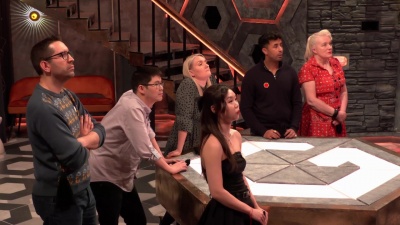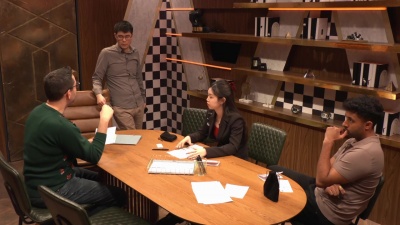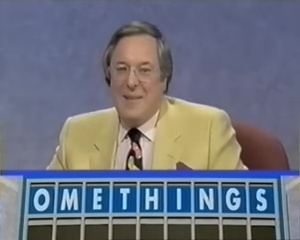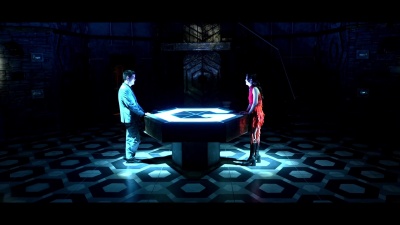Weaver's Week 2025-06-15
Last week | Weaver's Week Index | Next week
"If I'm a carrot, I cannot become a potato."
Genius Game
Remarkable Productions for ITV, 30 April – 11 June
So, Genius Game has finished on ITV. It's the show where very clever people are given intellectual and social challenges, and after some competition episodes a winner is awarded a very decent amount of money.
Look, you're reading UKGameshows, you probably watched some of this programme. Maybe the whole thing, maybe you tuned out after a few episodes. You weren't alone to switch off after a time, Genius Game has had very low viewing figures, consolidating at just over one million viewers per week.
Would that make the show a flop? We will argue that Genius Game was the right programme at the right time in history; its placing on the schedule and reception raise difficult questions about where ITV is as a network, and what we expect from television.
Twenty-two years earlier...
The BBC opened its new channel BBC4, a place for people who think. It was full of highbrow arts, intellectual pursuits, and leisurely international affairs. The channel wasn't just starch, it also had some entertainment programmes. QI was the most notable, a gentle wander through Quite Interesting things, hosted by Stephen Fry; and featuring Alan Davies as the everyman, a character who might have stumbled on BBC4 by mistake.
To the surprise of a few people, QI proved to be quite the success. Having been incubated on BBC4, the programme moved to BBC2 after a few series. There was an effort to make the crackling wit a show on BBC1, but it didn't quite work and new episodes moved back to BBC2 after a short while. QI has survived a change of host (Fry regenerated into Dame Sandi Toksvig) and is probably being repeated on the Dave channel while you're reading this.
Back to the present day
The opening episode of Genius Game introduced us to the players. The "professor". The "student". The "entrepreneur". Titles assigned by the producers, not selected by the contestants. Titles assigned for the publicity machine – they were barely used on screen, and consigned to the oubliette as quickly as possible. Astute viewers might compare this against BBC2's concurrent Chess Masters series, which assigned titles to its players and kept using them throughout the series.
Genius Game is based on a Korean series that ran in the early 2010s. It didn't attract huge viewing figures, but the people who watched it loved it, and a lot of the people who watched it did not watch anything else on the network. "The Genius" in Korean was a net positive for the network: widened their reach, exposed the channel to extra eyeballs, and attracted a new audience for the commercial breaks. Sadly, we don't have reliable demographic data about who has been watching ITV's Genius Game; we would not be hugely surprised if many of the million who did watch the show did not watch many – or any – other programmes on the ITV networks.
David Tennant was the face of Genius Game. The star of Broadchurch and Doctor Who and Dramarama and many other shows. He's a famous face, he's a familiar face. He's the sort of face who regularly hangs about with intelligent, clever, and sharp people; goodness, if The Doctor was a real person at a loose end, they'd fit right into Genius Game.
But David Tennant was only ever shown on the big screen, delivering soliloquies. He didn't interact with the contestants, left all that to his representatives on Earth, the Dealers. Genius Game had been sold as a David Tennant show, and he was barely in it. Perhaps it might have been better for the show itself to be the star, for the games to be introduced by a relatively anonymous person – one of the regular Dealers, someone from the production gallery.
"Is there anything I can do to sway that decision, like at all?"
"Give her the token of life. But that decision has already been made."
Episode six was a team game, the Diamond Dilemma. Ken, Ben, and Charlotte played Bodalia, Alison, and Bex. Each player began with a personal pile of ten diamonds. The team that collectively deposited more diamonds in each round won the round, but once you've deposited a diamond, you don't get it back. The number of diamonds deposited by the losing team is published, but not the number deposited by the winning team. Whichever team wins three rounds wins the game.
Ken-Ben-Charlotte played an aggressive game. Each put three diamonds in the first round, each put three diamonds in the second round. They won 9-4 and 9-1, and had perfect information about the game. Except: when was the right time to play their remaining diamonds? They bet on "straight away", got beat 14-12, and lost the match.
The sliding doors moment came when Bex managed to forget her final play: was she meant to deposit the one remaining diamond, or keep it? Bodalia and Alison assumed Bex would know to play and force a three-way joint win; Bex thought she and one of the others was keeping their diamond out to win the game and introduce an extra garnet into the prize fund. Or, if they lost, to avoid being the first Death Match player.
It meant Bex was the sole winner, she couldn't protect both team-mates. Ben was chosen for the Death Match, picked Alison, and beat her at a game of memory and luck.
Genius Game had intellectual rigour, and was absolutely uncompromising in its style. No, we cannot describe the style to you in words, because it has to be experienced. There are elements of technology, and of steampunk, and demonstrative social climbing, and subtle social climbing-all-over-each-other. The show was like nothing else on television. This is a positive, because it allows the producers to make the show they wanted. It's also a negative, because viewers are going to be flailing and floundering and unsure what the show is asking of them.
Eight months earlier...
Last summer, BBC4 showed some Vintage Quizzy Mondays shows. Call My Bluff, the word definition game that's slightly about words and mostly about whether you trust the smartie-pants on the other side. Going for a Song, where contestants and viewers were assumed to have interest in antiques. And Face the Music, a show about classical music. In their way, each of these programmes was completely uncompromising. If you knew nothing about antiques, or classical music, you weren't going to get much out of these shows.
But you were going to get something from the show: the vicarious enjoyment of someone talking about their favourite subject, and talking with knowledge and passion. And someone talking with knowledge and passion, sharing their knowledge of the subject they love, that can be compelling television.
Sixteen years earlier...
BBC4 introduced the new show Only Connect. This column found the first episode slightly baffling, but looked quite interesting. The second episode, although played to a lower standard, was definitely interesting, and after about a month we'd got the hang of this new programme and could play along quite well.
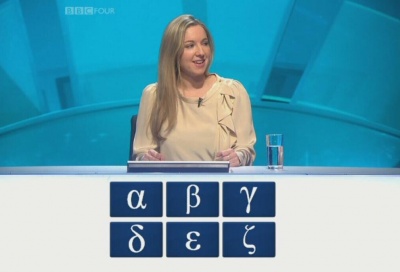 This smartie-pants became popular, especially after ditching the pretentious Greek letters. (Presentable)
This smartie-pants became popular, especially after ditching the pretentious Greek letters. (Presentable)
Then they moved into the quarter-finals.
Yikes! Somebody's just moved our cheese! We thought this was a show we understood, but now it's become much much harder. But, again, we grew acclimatised to the new demands on us. Second qf, not sure we got many points, but at least we understand the answers. Last quarter, hey, this is rather fun, watching people try to answer questions, even if we don't know many of the answers.
Back again to the present day
Genius Game took us on a similar journey. If you're prepared to stick it out, Genius Game went from confusion at what was happening — to insight as we worked out what was happening — to being able to predict what will happen — and eventually to having fun and relaxing with the remaining players.
All this took time and effort. Modern television tends not to ask its viewers to invest time, and it certainly doesn't ask viewers to make any effort to understand what's going on. This is common across the culture, the spirit of inquiry has been diminished. If there isn't an immediate emotional payoff, some viewers are going to turn off.
Many of them will flick over to the football, live matches on a Wednesday night are certain to deliver a result and high drama; never mind that it's 85 minutes of waiting for something to happen. Other viewers preferred to stick with what they know, the emotional manipulation and tourist attractions of Race Across the World, vicarious enjoyment of the road to Ulanbataar / Tarawa / Bayambang / Eatonswill (or wherever it is they've been this series).
Perhaps it didn't help that Genius Game was very short on laughter. Many of the lighter moments ended up on the cutting-room floor, and only came out because some of the contestants have blogged and vlogged and spoken about their time in the studio. There was often a level of absurdity about proceedings, and the producers chose to ignore it. For instance, at one point in the "Codebreakers" episode, contestant Ben was running around trying to keep sixteen different plates spinning, and we might have had some silly music for a daft situation.
Genius Game is a storied series, the Korean original show (The Genius, 2013-15) became very popular amongst the sort of people who a) watch subtitled programmes b) watch shows of intellectual and social smarts and c) share their love for these shows online. People who liked The Genius really liked The Genius, and the campaign for a British version began almost as soon as their original show began.
This great fandom brings a certain level of expectation. On some of the other internet fora, contributors expected shows to be as good as they remembered the original to be. Not even as good as the original was, but as good as their rose-tinted memories of the original. Both the ITV version and a 2022 Dutch interpretation were burdened with the millstone weight of fandom nostalgia. When even your most dedicated fans are dragging your show down, it'll be a struggle to stay afloat.
The press caught other ideas about Genius Game, almost as if they'd never seen an episode of the show. "David Tennant's new quiz..." began one syndicated billing. Sweetheart, Genius Game is not a quiz. It is many things, but it is not a test of fact-based recollection. (These are the same papers that described Countdown as a quiz well into the 1990s, and Richard Whiteley as "asking the questions". You'd think that, after 1500 episodes, someone would have seen an episode and spotted their error.)
Genius Game is not a quiz. Nor is it a pure test of intellectual smarts like The 1% Club. No, it's far more a test of social and emotional intelligence. Can you work out a strategy to win? Sure. But it'll involve a set number of other people who you've got to be able to trust completely and totally. The "bubble" in episode 2's zombie challenge is precisely that meld of logical and social intelligence.
As much as we appreciated Ben's cocky play in episode 3's Wordfinder challenge, we have to admit that it made for a disappointing game. And as much as we appreciated the race for the win and all the grovelling in episode 5's Safari Race, we all knew who was going to be the loser and a large chunk of the episode was playing out the inevitable.
Turn! Turn! Turn!
A common thread linked the victories in episode seven, one with a Crowning Moment of Awesome, one by detailed knowledge of the rules.
Let's start with the main game, which was effectively a tie between Ken, Ben, and Charlotte for the win. It was resolved with Ken ostentatiously writing a cheque to the Social Media account, fully aware that he could also write a cheque to the Newspapers account and – because of the order cheques were processed – the cheque in Social Media would bounce. Ben and Charlotte both tried to beat him in Social Media, not realising that they were vulnerable in Newspapers and Radio.
Ken had, quite simply, outsmarted his other players; he'd followed the letter of the rules and leveraged some unintended consequences. It's the single most jaw-droppingly brilliant solo play of the series, and he deserved his place in the final.
There was a sliding doors moment at the start of the game, because Bex almost had a winning strategy. She said "I'm going all in on Radio, all of it", but then could have invested zero pence in Radio, and stuck 33,000 garnets into the other funds. The result would send Bex straight through to the final, left lots of people locked out of lots of funds, and quite possibly a decision to make on who Bex will eliminate.
Ben's strategies turned out to be great at not losing; in the semi-final, he had to win, and that required something else. Bodalia emerged as kingmaker, able to send Ben or Charlotte to the final; it's another sliding doors moment as to whether his final bluff would be on time (in which case Ben would have made it) or out of time (sending Charlotte through). Having made his decision, the winner was determined by whoever was going first on that round.
The final pitted the best solo player against the best team player. The result was never in doubt, though the winner used psychology to make their position appear weaker than it really was. And that's completely in keeping with the idea behind the show, though it felt like team and social play was the main driver to get one towards the final.
This series of Genius Game saw that being smart and being quietly nice will get you through to the final. Being more overtly nice and manipulating people around your idea also got someone through. Not betraying people and being utterly trustworthy was rewarded to a point; betraying people and being untrustworthy ended Amanfi's challenge early.
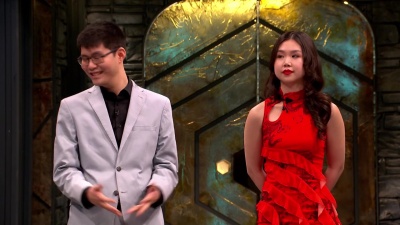 Finalists Ken and Charlotte prepared for competition. Want to find out who won? Watch the show. (Remarkable)
Finalists Ken and Charlotte prepared for competition. Want to find out who won? Watch the show. (Remarkable)
Watch more
(Above two both .gb only)
Contestant Ben delivers recaps of the episodes he was on
Dealer's Room podcast (also Spotify RSS)
GG, GG
Before the series started, this column said that Genius Game would find its audience. We are happy that Genius Game has found its audience. The audience is smaller than we might have hoped; better marketing and a better timeslot might have attracted more people to the show as it went out, but we cannot really expect the show to reach more than two million viewers.
Low viewing figures are not necessarily a bad thing. ITV gives over large swaths of its schedule to horse racing; the fixtures shown on the main ITV network are seen by even fewer viewers than Genius Game. And that is perfectly fine; ITV correctly believes there's social merit in serving this small audience, there is kudos to the station for showing the matches, it will bring new viewers to the channel, and viewers will see both the commercial adverts and be tempted to watch other ITV programmes.
But ITV is a commercial station. It's not a charity, and it needs to make its money back. Genius Game has under-performed: last year's ragtag of shows up against Race Across the World achieved around 2 million viewers. Perhaps Genius Game needed to be a word-of-mouth show, made primarily for the ITV Player with a linear airing to keep interest high. Perhaps ITV was the wrong network for Genius Game, but who else would take the commercial risk? Channel 4, Channel 5, the BBC, they all had the chance to buy up the format and chose not to do so. We have to acknowledge that ITV took a risk, and it is the nature of risks that sometimes the risk just won't work out.
Perhaps we need to reconsider what ITV is: a broadcaster appealing to everyone all the time, or a broadcaster that makes appointment-to-view programmes for specific audiences? Is ITV after eyeballs for an individual programme, or would it be better chasing heads tuning in at some point across the week or the month? Should ITV look to maximise total viewership across all its output, or viewership for an individual show?
We hope that there is room, somewhere in the streaming market, for a second series. Right now, all we have is hope.
"Ugly victories and beautiful defeats" was a catchphrase from the Korean original series. In this column's view, Genius Game was a beautiful defeat. Everyone involved: the producers, the visual designers, the evil sadists who invented these games, the costumers who gave the contestants a striking look, and especially the contestants. Everyone played their part to make Genius Game happen, and it's a shame that more people haven't – yet? – come to appreciate it. If this is to be a one-series wonder, it is one we'll look back upon with great fondness.
In other news
Sorry to hear that Howard Pizzey has died. A stalwart of the quizzing scene from the 1980s and well into the present century, the finance officer was a formidable competitor on Fifteen-to-One and Mastermind and Only Connect and many many other shows. He was generous with his time and knowledge, and contributed more than a few pointers to this website.
Our best memory of Howard is from his time on Give us a Break, a snooker-on-the-radio quiz where you would have a pop music question for 1 point, then a colour – from the easy yellow to the nigh-impossible black – and the break ends with your first wrong answer. Howard went red – black until he'd cleared all the reds, then completed the set of colours. We've never heard anything like the host of Give Us a Break, Dave Lee Travis was ranting and raving for weeks afterwards. The maximum possible score had never been achieved before, and was never achieved again; Howard Pizzey missed the final black as he won the half-year final.
New to BBC3: The Traitors New Zealand (from Mon). Grand final of Glow Up (BBC3, Wed), and reunion episodes for I Kissed a Boy (BBC3, Mon) and Race Across the World (BBC1, Wed).
If you're missing Noel Edmonds, set your targets to ITV on Friday, when Noel Edmonds' Kiwi Adventure begins. Do remember that The Chase and Tipping Point are only on ITV on Monday, this is to allow coverage of horses going at full clip-clop.
To have Weaver's Week emailed to you on publication day, receive our exclusive TV roundup of the game shows in the week ahead, and chat to other ukgameshows.com readers, sign up to our Google Group.



